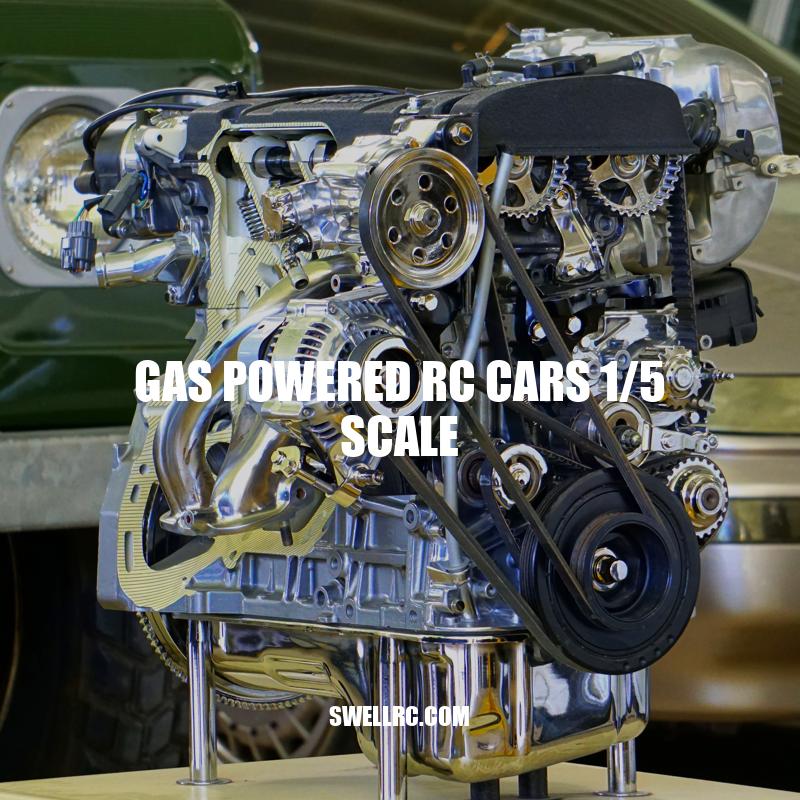Gas Powered RC Cars 1/5 Scale: The Ultimate Guide.
Gas Powered RC Cars 1/5 Scale: Everything You Need to Know
Gas-powered RC cars, particularly the 1/5 scale models, have become increasingly popular among RC enthusiasts. These cars offer a more realistic driving experience, thanks to their combustion engines, which produce sound and exhaust. Gas-powered RC cars are also faster than electric models, making them ideal for those who enjoy high-speed driving and racing. Moreover, 1/5 scale cars provide a much larger size as compared to other types of remote control cars. Their size allows for even more realistic driving experiences, and the ability to customize and improve their performance is extensive.
Compared to electric models, gas-powered RC cars are more durable, making them perfect for those who love to perform stunts, flips, and other high-impact driving maneuvers. Additionally, these cars have more horsepower and torque, enabling them to climb higher inclines and tackle rough terrain with ease. Interestingly, the maintenance requirements for gas-powered vehicles are not too different from that of a real car. Regular oil changes, air filter changes, and other forms of maintenance are necessary to keep these cars running smoothly.
Despite their advantages, there might be a few downsides to gas-powered RC cars, especially if you are new to the hobby. For instance, these cars require a higher budget in the long-run since they run on gas. In comparison, electric models can be more budget-friendly. It is also important to note that the fumes from gas engines can be hazardous, and therefore, gas-powered cars should not be operated indoors.
Overall, gas-powered RC cars are an exciting and engaging option for RC enthusiasts. Whether you are an experienced player or a beginner, these cars offer a unique experience, combining speed, power, and realistic sound effects to create an unparalleled driving experience.
Gas Powered RC Cars: Different Types and Features
Gas-powered RC cars are available in various types and features. Below are some of the types you can choose from:
- Off-road RC cars: These are designed to tackle rugged terrain, with features such as raised ground clearance and heavy-duty suspension systems.
- On-road RC cars: These are designed to drive on smooth surfaces such as roads or tracks. They feature low ground clearance and aerodynamic bodies to cut down on air resistance.
- Buggy RC cars: These cars are somewhere between off-road and on-road RC cars and feature small tires and minimal suspension. They can handle some off-road terrain but are better suited for smooth surfaces.
Features to consider when purchasing a gas-powered RC car include horsepower, torque, top speed, and the type of engine. Additionally, you may also want to consider the following features:
- Radio control systems: These systems allow you to control the vehicle from a distance. Some high-end models feature advanced systems with multiple channels for greater precision and control.
- Chassis material: The material used in the chassis affects the durability and performance of the car. Common materials include aluminum, plastic, and carbon fiber.
- Drivetrain type: The drivetrain affects the car’s handling and stability. The most common types include front-wheel drive, rear-wheel drive, and all-wheel drive.
If you’re looking to buy a gas-powered RC car, you might want to consider checking out websites such as RC Planet or AMain Hobbies. These sites offer a wide variety of gas-powered RC cars, including 1/5 scale models. Retailers such as Amazon also have a vast selection of remote control cars to choose from, although it’s always important to do your research and read reviews before making a purchase.
How do gas powered RC cars work?
Gas powered RC cars work by using a small engine that runs on gasoline fuel, which powers the car’s wheels and propels it forward. Here’s a breakdown of the basics:
- Gas powered RC cars use a mixture of gasoline and oil for fuel.
- The fuel mixture is ignited by a spark plug in the engine to create energy.
- The energy created by the engine is transferred into the car’s wheels through a transmission and drivetrain.
- Gas powered RC cars typically use more sophisticated suspension systems to help them handle rough terrain.
There are many different types of gas powered RC cars available, ranging from small, remote-controlled models to larger, more powerful vehicles designed for racing. If you’re interested in learning more about gas powered RC cars, you can find plenty of resources online. Websites like Horizon Hobby and Tower Hobbies offer a wide selection of gas powered RC cars, as well as parts and accessories to keep them running smoothly.
Gas-powered RC cars have their advantages, but they also come with a few drawbacks. Below are some of the pros and cons of owning gas-powered RC cars 1/5 scale:
| Pros | Cons |
|---|---|
| Greater speed and power than electric cars | Require more maintenance |
| Realistic engine sounds | More expensive to operate due to fuel costs |
| Durable, built to withstand crashes and other forms of wear and tear | Not as environmentally friendly as electric cars |
| Customizable to suit driving styles and performance needs | Can be louder than electric cars |
Some interesting facts about gas-powered RC cars 1/5 scale include:
- 1/5 scale gas-powered RC cars are the largest and most powerful of the RC car sizes, making them an exciting and challenging option for advanced drivers.
- In the early days of RC car racing, gas-powered cars were the only option. It wasn’t until the invention of small, powerful electric motors that electric cars became a viable option.
- The first gas-powered RC car was made in 1965 by a company called Mardave Models. The car was powered by a small gas engine designed for model airplanes.
If you’re interested in purchasing a gas-powered RC car 1/5 scale, it’s important to do your research and understand the pros and cons before making a purchase. Websites such as Tower Hobbies and nitrorcx.com offer a wide variety of gas-powered cars and accessories, making it easy to find the perfect car for your needs. Additionally, there are many online forums and groups where you can connect with other gas RC car enthusiasts and get advice and tips on how to get the most out of your hobby.
What’s better petrol or electric RC cars?
Petrol and electric RC cars both have their benefits and drawbacks. Here’s a quick rundown of the two:
| Petrol RC Cars | Electric RC Cars |
| — | — |
| More powerful and faster | Slower and less powerful |
| More difficult to maintain | Easier to maintain |
| Use more expensive fuel | Cheaper to charge |
| Make more noise and produce exhaust | Quieter and more environmentally friendly |
Overall, the choice between the two will depend on personal preferences and specific usage scenarios. Petrol RC cars are better suited for experienced hobbyists looking for maximum speed and performance, while electric RC cars are great for beginners, indoor play, and younger enthusiasts.
If you’re looking for specific product recommendations for either option, popular RC retailer websites like Horizon Hobby and Tower Hobbies offer a wide selection of petrol and electric RC cars to choose from.
Gas-powered RC cars may require a bit more maintenance than electric models, but many enthusiasts find that the increased speed and power are worth the extra effort. These cars offer a level of excitement and realism that electric cars simply can’t match. They are fun to customize and modify, and there’s a certain satisfaction that comes from building and maintaining a gas-powered engine.
If you’re new to gas-powered RC cars, it’s important to take the time to learn about proper maintenance and care. Regular oil changes and air filter cleanings are essential to keeping your car running smoothly and prolonging its life. In addition, it’s important to use the proper type of fuel and to store your car properly between uses.
Overall, gas-powered RC cars are an excellent choice for those who want a fast, customizable, and exciting RC experience. Whether you’re a seasoned pro or just getting started, these cars are sure to provide hours of fun and entertainment. Just be sure to do your research and learn about proper maintenance to ensure that your car stays running smoothly for years to come.



